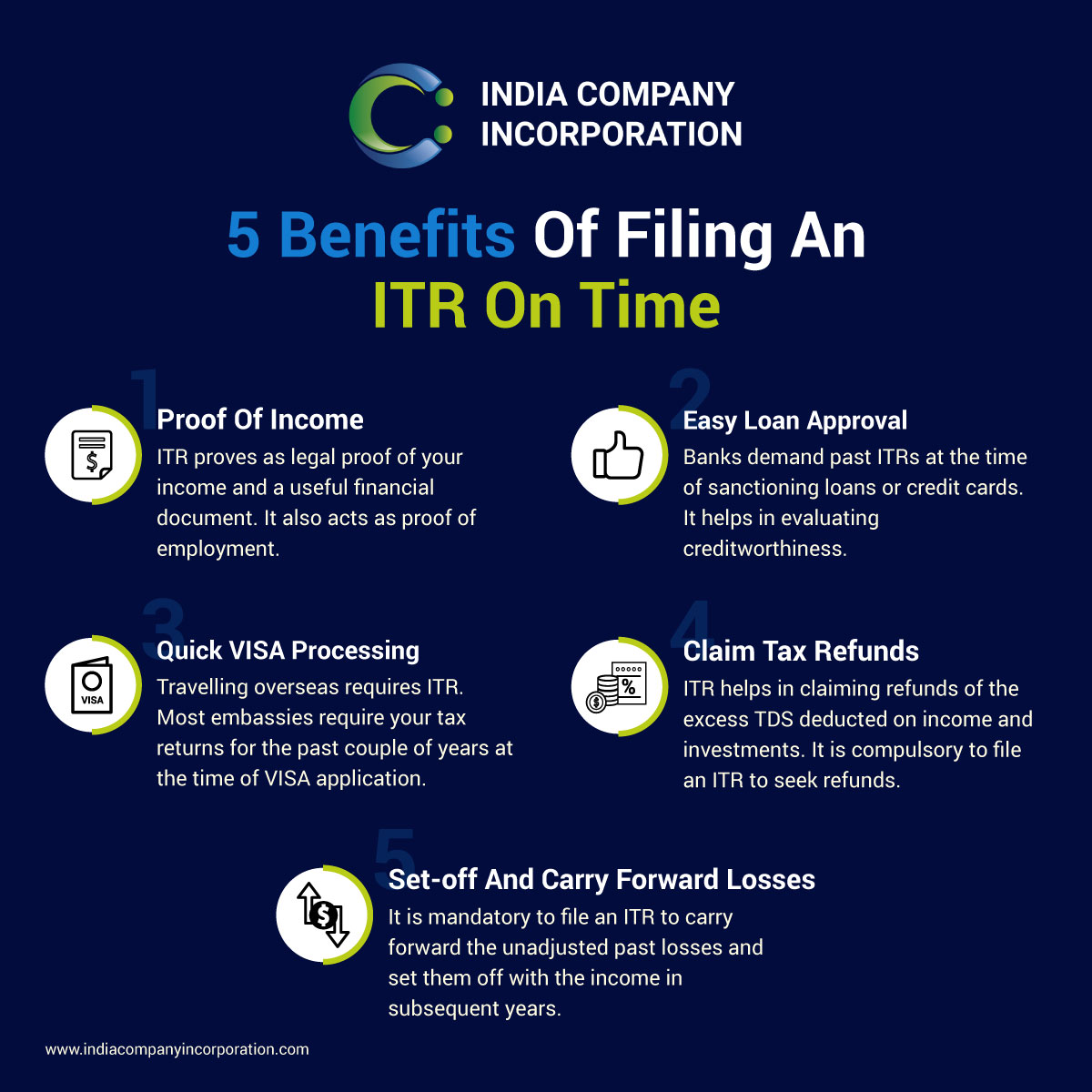Income Tax Filing
Income tax filing can be time-consuming and complicating. We got you!
We will assist you with all your Income tax-related compliance.
Get in touch with us today.
- 5000+ Businesses Served
- 9.6/10 Unfiltered Customer Ratings
- Satisfaction or Money Back Guarantee
Our Income Tax Filing Packages Start From ₹6,999/- All-Inclusive
What is Income Tax Filing?
Income tax filing is mandatory compliance to a person including Individual, Partnership firms, LLP, Company, etc. to report their total income during a financial year and tax liability arising on the same. This eases the Government to collect the tax and incur more expenditure for the public welfare and also calculate the growth of the nation. This also benefits the taxpayer/person filing the return in various ways mentioned below.
Table Of Contents
Who is required to file an Income-tax return?
- The provision of the Income-tax Act,1961, has made the following person mandatory to file Income-tax returns:
- An individual, having total income exceeding the basic exemption limit (i.e., ₹ 2,50,000/) during a particular financial year
- Hindu Undivided Family (HUFs)
- Partnership firms and Limited Liability Partnerships (LLP)
- Any Private or Public company (including the foreign company) doing business in India
- A foreign company taking treaty benefit on a transaction in India
- Association of Persons (AOP)
- Body of Individual (BOI)
- A non-resident having any income source from India
- For assess, who wishes to claim a tax refund or carry forward losses under any head
- Individual, being an Indian resident, holding an asset or any financial interest in an entity situated outside India
- An Indian Resident, being a signing authority in a foreign account
- Note: The basic exemption limit for an individual with age more than 60 years is Rs. 3,00,000/- and individual with age more than 80 years is Rs. 5,00,000/-
Advantages of Filing Income Tax Returns
- Useful in Visa's quick processing as most embassies and consulates require a copy of your filed Income-tax return
- To gain credibility for easy approval of Vehicle loan, housing loan, etc. from a bank or financial institution
- Income-tax returns also serve as proof of your Income and Address
- To avoid penalties to an individual, which can be levied by the Income-tax department up to ₹ 10,000/-
- To claim an Income-tax refund in case of TDS deducted is more than your tax liability
- The return must be filed within the due date to carry forward and set-off the losses in further years

ITR Forms
| ITR form | Eligible assessee |
|---|---|
| ITR-1 |
A resident individual with
|
| ITR-2 |
Individual (Resident/Non-resident) or Hindu Undivided Family (HUF):
|
| ITR-3 |
An Individual, including a partner in a firm or Hindu Undivided Family (HUF):
|
| ITR-4 | Individual, HUF, a partnership firm (other than LLP) being a resident having business/professional income being computed on a presumptive basis. |
| ITR-5 |
A person such as:
|
| ITR-6 | Every company, except those claiming exemptions u/s. 11 of the Income Tax Act, 1961. |
| ITR-7 |
Persons including companies which are:
|
Related read:Income Tax Returns (ITR) AY 2021-22: Which ITR Form Should You File?
Due dates for filing Income-tax return
| Type of Taxpayer (assess) | Due date |
|---|---|
| Individual | 31st July |
| Hindu Undivided Family (HUF) | 31st July |
| Body of Individual (BOI) | 31st July |
| Association of Persons (AOP) | 31st July |
| Businesses (liable for Tax audit) | 30th September |
| Businesses (liable for TP reporting) | 30th November |
Advance Tax Compliance
- Advance tax is nothing but tax paid in advance during the year in installment instead of paying in a lump sum after the end of the year. Tax liability calculated during the year are paid in proportions in advance based on estimated Income for the whole year.
-
Who is required to pay Advance tax?
Taxpayers, having total tax liability of Rs. 10,000/- or more during a financial year. -
Due dates for Advance tax payments:
% of total tax payable in advance Due date 15% of the total tax On or before 15th June 45% of the total tax On or before 15th September 75% of the total tax On or before 15th December 100% of the total tax On or before 15th March -
The due date for taxpayer opting for a Presumptive taxation scheme for Business income
% of total tax payable in advance Due date 100% of the total tax On or before 15th March -
Exemptions from Advance tax provision:
An individual with age more than 60 years and does not have business income is exempt from Advance tax provision. - Punishment related to Advance tax: Non-payment or less payment of advance tax specified by law will attract interest liability under section 234B and 234C of the Income-tax Act, 1964.
Related read:How To Save More Taxes Using An Income Tax Calculator?
Tax Audit & Its Applicability
| Business / Profession | Conditions for applicability of Tax audit |
|---|---|
| Business | If taxpayer’s total sale/turnover/gross receipts during the relevant financial year
|
| Business eligible for presumptive tax scheme u/s. 44AD, 44AE, AABB and 44BBB | A taxpayer claimed lower profits for his business than the profit computed under Section 44AD or 44AE or 44BB or 44BBB. |
| Profession | If a taxpayer’s turnover/gross receipts exceeds Rs. 50 lakhs during the relevant financial year. |
| Profession, eligible for presumptive tax scheme u/s. 44ADA | A taxpayer claiming lower profits for his profession than the profit computed under Section 44ADA |
Penalty & Interest Related to Income Tax
-
Interest liability:
Filing late Income-tax returns beyond the due date attracts a simple interest of 1% p.m. under section 234A, starting from 1st day of next financial year (i.e., 1st April) till the date of filing the return. -
Penalty
1. Further, a penalty of Rs. 5,000/- can also be levied section 234F, which may extend to ₹ 10,000/-
2. However, if the total income of a taxpayer does not exceed ₹ 5,00,000/- in such cases, the maximum penalty amount shall be ₹ 1,000/-
How will we help you?
- We have a team of experts for computing your income and for filing the return.
- Just click here to submit your request
- Fill a simple checklist provided by our team members.
- Submit the required documents intimated by our team based on your income structure
- We will compute your tax liability and inform you the same.
- Further, selecting the appropriate ITR form, your Income-tax return will be filed.
- In case you have any queries or updates, a dedicated manager will be assigned to you for any communication or updates.
Still have doubts?
Please speak to our experts who shall solve all your doubts.
Call us @+91 7738066334 or Mail us at info@indiacompanyincorporation.com
FAQs
Non-taxable income is limited to Rs 2.5 lakh for individuals. You may be entitled to a Rs 2,500 refund under section 87A if your total income for FY 2018-19 is less than Rs 3.5 lacs. From FY 2019-20 onwards, the rebate for income under Rs 5 lakh has been raised to Rs 12,500.
As a result, starting in FY 2019-20, everyone earning less than 5 lakh will not have to pay any income tax. You won’t have to pay any taxes until you reach Rs 6.5 lakh if you have up to Rs 1.5 lakh in tax-saving investments under section 80C.
A new tax regime has been introduced by the Finance Minister for individuals and HUFs with an annual income of Rs. 15 lakh. It creates new tax brackets with lower tax rates and no deductions or exemptions (80C, 80CCC, 80D, 80G, mortgage interest and LTA, HRA, Standard deduction from salary, etc). The tax rates in the ‘New tax regime’ is the same for all categories of Individuals, i.e Individuals & HUF upto 60 years of age, Senior citizens above 60 years upto 80 years , and Super senior citizens above 80 years. Hence there is no increase in the basic exemption limit.
Individuals, HUFs, AOPs, and BOI taxpayers are taxed based on their income slab, while firms and Indian companies have a fixed rate of tax computed on their profits. Income is grouped into tax brackets or tax slabs, and the tax rates vary depending on the tax slab.
What Our Clients Say About Us!






